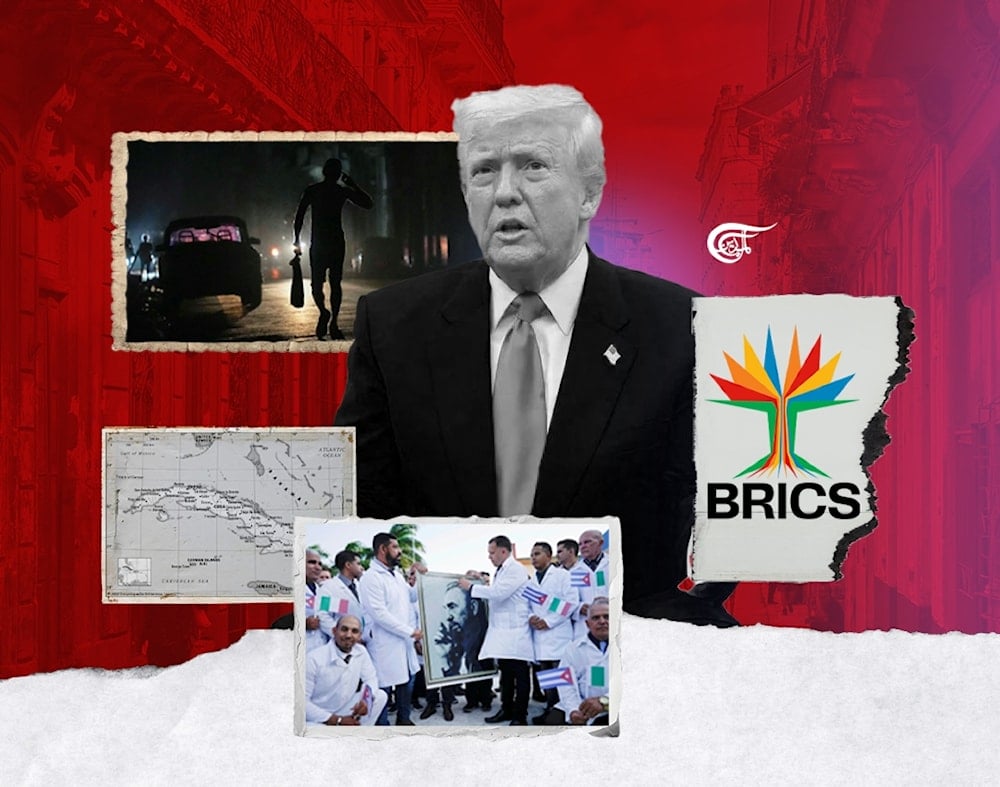Update March 2025: The Cuban economy and living conditions
Tim Anderson reports from Cuba on worsening deprivation due to the renewed US blockade under Trump’s second term, which is severely impacting food, medicine, and economic recovery efforts.
-

Cuba faces an urgent need for relief, and the second Trump administration is doing its best to sabotage recovery in all sectors as a means of punishing the Cuban people. (Al Mayadeen English; Illustrated by Zeinab El-Hajj)
By early 2025, Cubans were once again suffering extreme deprivation since at least the COVID crisis (2020-2022), which, combined with restrictions imposed by the first Trump presidency, killed the tourist economy. This current deprivation follows the deep crisis of the 1990s, after the collapse of economic agreements with the Soviet bloc. Since the 1990s, there were a couple of waves of economic improvement: first in 2005-2006, when the benefits of the ALBA ‘doctors for oil’ exchange with Venezuela were felt, and then again in 2016-2018, when the limited openings from President Obama led to a brief boom in tourism (with up to 5 million tourists per year, prior to the COVID pandemic).
The current deprivations include lack of food and medicine and repeated power cuts, including from nationwide blackouts. These problems are exacerbated by inflation and currency instability, which has reduced purchasing power. A dual currency system is currently being re-introduced (with many imports being processed in foreign currency). Average salaries (converted to dollars) are between $10 and $20 per month, there are serious shortages on the ration booklet (libretta), and most local prices have risen. Emigration persists, particularly amongst youth, but with rates declining in recent years.
There is an urgent short-term need for relief from these deprivations, all of which stem from the US blockade – now intensified by a new set of measures from the second Trump administration that increasingly target third parties attempting to cooperate with Cuba.
The US blockade under Trump’s second administration includes these measures:
- Financial penalties for third parties trading with or helping finance Cuba;
- Intimidation of foreign tourists by threats of non-entry to the USA;
- Threats to third-party countries which accept Cuban doctors;
- Penalties on those seeking to assist Cuba on humanitarian grounds;
- Severe restrictions on family remittances from Cuban families in the US;,
- Returning Cuba to the US list of “state sponsors of terrorism”, a list which has nothing to do with actual terrorism but which acts to intimidate and block banking transactions with Cuba;
- Designating occupied Guantanamo Bay as a dumping ground for thousands of unwanted Latin American immigrants to the USA.
Sugar exports have not been central to the Cuban economy since the 1990s. While there are still significant exports of sugar, nickel, and tobacco in recent years, the most important hard currency earners have been (1) medical services, and (2) tourism. Pharmaceuticals are also an important industry and involve partnerships with China, Vietnam, and Iran. Cuba remains the largest trainer of doctors in the world, accepting “compensation” payment from other countries according to their capacity.
In the medium term, the challenges for the Cuban political economy, after the restructuring reforms of the 1990s and 2010, include these important matters:
- Restoration of medical services agreements, in the face of systematic US obstruction, Cuba has a surplus of trained health professionals, ready for large missions;
- Restoration of tourism, in the face of systematic US obstruction, Cuba currently has an oversupply of hotel capacity, much of it built just before the COVID crisis;
- Building local food production capacity, so as to reduce reliance on imports, this has been addressed through leasing arrangements which have had only limited success; the recent rice growing agreements with Vietnam will help, but more assistance with domestic agriculture is needed;
- Restoration of power supply to the national grid, much of this grid was renovated in 2005-2006, but maintenance has again faced serious problems, the recent contribution of solar panels from China is very welcome;
- Restoration of fuel for transport and all other industries, supply from Venezuela has resumed but at lower levels than before, and local oil supply remains inadequate;
- Removing ‘bottlenecks’ in the wholesale-retail sector, a problem currently being addressed, albeit in a rather bureaucratic way; some management assistance might be useful.
Chinese assistance in the power sector has broken through the delays. Photovoltaic units were arriving and being distributed to the provinces, while I was still there. Further assistance to the national grid will be necessary.
Trump seems determined to obstruct third party relations with his island neighbours. US Secretary of State Marco Rubio was recently slapped down by Jamaican Prime Minister Andrew Holness and Trinidad and Tobago Prime Minister Stuart Young for spreading false stories about Cuban doctors working in their countries.
In short, Cuba faces an urgent need for relief, particularly as large-scale tourism has yet to resume, and the second Trump administration is doing its best to sabotage recovery in all sectors as a means of punishing the Cuban people. Cuba has great potential in the health cooperation, tourism, and pharmaceutical sector,s but US obstruction is strong.
The island nation recently became a ‘partner member’ of BRICS, but there are so far no visible benefits. However, this situation could shift if the major BRICS members provide financial assistance and engage in cooperative efforts that bypass the US-dominated financial infrastructure.

 Tim Anderson
Tim Anderson
 5 Min Read
5 Min Read











